- Home
- Jeremy Robinson
Cannibal Page 2
Cannibal Read online
Page 2
And another.
And another.
At her breast, Virginia began to wail again, but Eleanor did not hear her daughter’s voice. Her ears were filled with the sound of her own screams.
1
Quintana Roo, Mexico
Raul Campos held the walkie-talkie out at arm’s length, shook it, then keyed the ‘talk’ button again. “South gate, come in.”
This time the response was immediate. “South gate. All clear.”
Campos recognized the voice of Antonio Garcia, but the delay in the man’s response, albeit a delay of only a few seconds, troubled him. He hit the transmit button again. “Tony, where is Rico? Is everything okay out there?”
“It’s good. Rico is on the west entrance.”
Some of Campos’s apprehension faded, but not all of it. He ran a tight ship and believed that there was no such thing as a minor lapse.
“Carry on,” Campos replied, clipping the radio to his belt. He turned his attention to the bank of flat-screen TVs that displayed closed-circuit camera feeds from thirty different locations in and around the compound, studying each one in turn for any sign that something was amiss.
“Do you think there’s a problem?” Chuy Rivera asked from his assigned station at the desk in front of the monitors.
Campos didn’t answer right away, not until he had studied every single feed for at least five seconds, a process which took almost three minutes. There was nothing on any of the displays to warrant his anxiety, but he was still not satisfied. When he finally spoke, it was not to answer the question. “Come with me. We’re going to check out the south gate.”
Rivera grabbed his weapon off the desktop—an Uzi 9mm submachine gun—and rose to his feet. He knew better than to second-guess Campos, but he did ask one question. “Should we tell Mano?”
Campos, who believed in following his own rules to the point of obsession, balked. There was probably a very simple explanation for Garcia’s slow reply; maybe he had been taking an unauthorized smoke break and left his radio in the gate shack. While that was the kind of thing that Campos might rightly get worked up over, it certainly didn’t justify bothering the boss while he was working. “No. It’s probably nothing.”
They exited the office, stepping out into the humid night air. Campos slipped behind the wheel of a small electric cart, and with Rivera seated beside him, they drove away from the security office toward the south gate.
The compound was dark, kept so intentionally to hide it from reconnaissance aircraft. Not that the compound’s existence or whereabouts was a closely guarded secret. The local campesinos knew exactly where it was, and they had no doubt passed the information along to the federales. Everything was kept dark so outsiders would not know what truly went on inside. There were rumors, of course. Part of Campos’s job as head of security was to monitor the flow of those rumors and to ensure if accurate information did get out, it would be quickly dismissed as superstitious gossip.
The darkness posed no hardship to Campos. He could have navigated the compound blindfolded. It took only a couple of minutes to reach the south entrance to the compound, but as soon as he stopped the cart, his senses went on high alert. Rivera started to get out, but Campos stopped him. “Wait.”
He put the cart in reverse and backed up twenty yards, coming to a stop behind a tree. The cart’s electric motor, which wasn’t very loud to begin with, fell silent as soon as Campos let go of the controls. He cocked his head sideways, listening for any unusual sounds or the silence that might indicate a lurking intruder.
The night seemed perfectly ordinary, filled with the chirp of crickets.
Still, he was not satisfied. He unclipped the radio again and brought it to his lips. “South gate, come in.” He spoke in a low voice, barely louder than a whisper.
The reply was immediate this time. “South gate, here.”
Definitely Garcia’s voice. So why does something feel wrong? “Be advised, Chuy is headed your way for a spot inspection.”
There was a slight pause. “Is something the matter?”
“That’s not your concern,” Campos snapped. Garcia should have known better than to question him. “Just be ready for Chuy when he gets there.”
“Understood.”
Campos lowered the radio and turned to Rivera, hefting his own Uzi as he spoke. “Go check it. I’ll cover you from here. Be careful. Something doesn’t feel right.”
Rivera slid out of his seat and strode up the path. Campos got out as well, ducking down behind the tree and training the barrel of his weapon on the door to the gate house. He held his breath, listening to the soft noise of Rivera’s footsteps. His eyes were adjusting to the darkness, and in the starlight, he had no trouble distinguishing the moving silhouette. Rivera reached the gate house, paused just a moment, then opened the door and entered.
Campos waited. Five seconds passed. Ten seconds.
Rivera should have come out by now. Something is definitely wrong. I have to warn Mano.
He laid the walkie-talkie on the ground and took a mobile phone from his pocket. When he touched the button to turn it on, the screen was so bright that he winced and looked away quickly, just in time to see something flash out of the darkness toward him.
He jerked away, feeling the air move as the object—a blade, it’s a knife blade!—sliced through the air above his head. His reflexes, honed from hours spent training and dozens of cage battles, not only saved his life but gave him the edge he needed to immediately strike back at his attacker. He lashed out with a foot, striking something so solid that, for a fleeting instant, he wondered if he had kicked the tree. But then the man toppled forward onto him, and he knew that he had scored a hit.
The man—he was sure it was a man—was huge, at least six feet tall and solidly muscled. But Campos had fought bigger and stronger. As the man threw his arms wide to regain his balance, Campos caught hold of the knife hand, trapping wrist and elbow in an arm-bar hold. He fell back, pulling the already unbalanced man down, and brought his legs up to immobilize and dominate his opponent.
For a moment, he held the man fast, their two bodies entangled like some kind of blacksmith’s puzzle. He could feel the man straining, trying to break the hold. Campos felt a thrill of excitement at the sound of the other man’s labored breathing—the almost bestial growl of exertion.
He will exhaust himself in a futile effort to break free, and when he is too tired to go on, I will—
Campos howled involuntarily as pain shot through his right arm. He tried to fight through the agony and maintain his hold, but even the act of trying to close his fingers unleashed a fresh wave of torment.
He broke my arm! That’s not supposed to—
Campos screamed again.
There was another stunning eruption of pain, this time from his left arm. He could hear the radius and ulna bones in his forearm snap like twigs. He felt the jagged ends piercing through muscle and skin. Through the red mist of agony, he saw his assailant towering above him, silhouetted in starlight. Campos tried to throw up his hands to ward off the imminent attack, but his appendages dangled limply, like dead things. The pain took him to the edge of unconsciousness.
“No,” he whimpered. “You’re not supposed to beat me.”
Then something slammed into the side of his head, and the darkness took him.
2
Stan Tremblay, callsign: Rook, stared down at the motionless form for several seconds until he was satisfied that the man wasn’t going to be a problem for him—or anyone else—ever again. “What was that he said?”
“Dunno,” was the casual reply from the small woman standing behind him. “No hablo Español.”
“I know for a fact that you habla,” Rook grumbled, but let it go. Probably some kind of macho death curse. ‘I spit at you with my final breath.’ Whatever.
He placed a booted foot on the dead man’s forehead and wrenched his knife loose from where it had pierced the man’s temple.
The woman was Zel
da Baker, and in addition to being Rook’s teammate, she was also his girlfriend. When she was on the clock, as she was now, she went by the callsign: Queen. Her pert features and blonde hair were obscured from view by an adaptive camouflage head covering, but Rook knew underneath she was grinning. She shook her head in amused disbelief. “Why’d you go Conan the Barbarian with the blade? Why didn’t you just shoot him?”
In the perfect clarity of hindsight, Rook had to ask himself the same thing. The truth of the matter was that he had been waiting for Knight—Shin Dae-jung, the team’s designated marksman—to reach out and touch the guy with a round from his silenced CheyTac Intervention M200 rifle. Knight probably had a good reason to hold back, but when it had become apparent that the target was about to make a phone call that would alert the whole compound to their presence, Rook had taken action.
“If I had shot him, he might have survived long enough to get off a few shots with that pea shooter. Then we’d have a gaggle of hombres to deal with.”
“Right,” Queen said, making no attempt to hide her sarcasm. “So instead you just went all Chewbacca on his ass, ripped his arms off and beat him to death with them.”
“First I’m Conan, then I’m a Wookie? I’m sorry, when did you change your callsign to Nerd Princess?”
She laughed, then continued more soberly. “You had me worried there for a couple seconds. Thought you might need to tag me in.”
“Naw. The guy was a Nancy. I eat his kind for breakfast.”
“Yuck.”
“What is this about blades and arms ripping off?” another voice chimed in, also a woman’s but colored with a harsh Slavic accent. “Rook, why did you not just shoot him? That’s what I did to his partner.”
Rook turned to face the pair of figures that were moving toward them from the direction of the gatehouse. Like himself and Queen, the two were covered head-to-toe in gray chameleon camouflage that masked their faces and jet black hair, but he had no trouble identifying his teammate, Asya Machtcenko, callsign: Bishop, or the team’s leader, Jack Sigler, callsign: King.
Despite the facts that they were brother and sister, and they shared nearly identical orange-brown eyes, the two were completely unalike in build and mannerisms. King was over six feet tall with a muscular physique—a narrower version of Rook, while Asya—Bishop, Rook corrected himself, She’s Bishop now—was petite, though no less capable or deadly than her big brother. Yet, even absent these identifying factors, Rook could have distinguished them from a thousand yards away thanks to the blue icons—each a two-dimensional likeness of the chess piece that corresponded to their respective callsigns—that hovered above their heads. A similar icon hung over Queen, and in the distance, not quite four hundred yards away, another marked Knight’s location on a hillside looking down into the compound.
The icons were not literally floating above their heads. They were instead integrated into a cutting-edge virtual environment that was projected onto the retinas of each team member. The display was courtesy of the very latest in virtual reality and quantum computer technology, all neatly packaged in a pair of nearly indestructible, black, sport-frame sunglasses. The chameleon suits utilized the same quantum computer in tandem with electro-magnetic sensors and a fiber-optic mesh fabric made of advanced meta-materials that could change color in response to the surrounding environment. Their weapons were also synced with the VR network to allow pinpoint, precision aiming. The five of them were, if not the deadliest special-operations warriors on the planet, at least the best equipped. Which was probably why Rook still felt a little foolish for having gone after the target with his comparatively low tech SOG Ops M40TK-CP combat knife.
King studied the motionless body of Rook’s fallen opponent. According to facial recognition software, another feature of the VR glasses, the man—Raul Campos—was a career criminal with ties to other cartels and a long string of unprosecuted crimes. There was no record of his ties to the emerging El Sol drug cartel, but based on the radio transmissions they had intercepted and appropriated, thanks to some audio-wizardry courtesy of the team’s resident tech expert, Lewis Aleman, they had learned Campos had earned his way to a position of responsibility in the El Sol organization.
Job opening, Rook thought with a morbid smile.
King nodded in Rook’s direction. “Not your best work, but there’s something to be said for doing things the old fashioned way.”
Rook turned to Queen. “Was that a joke? I can never tell with him.”
King ignored the comment, and when he spoke again it was for the benefit of the one team member who had not yet joined their little pow-wow. “Knight. Pick up and come to us.”
“On the move.” The reply was unusually terse, reminding Rook that if Knight had just done his job, the whole ugly wrestling match with Campos could have been avoided. He wanted to give his friend and teammate the benefit of the doubt—maybe he just didn’t have a clear shot—but he couldn’t help but wonder if…
He shook his head. Now wasn’t the time to start doubting his teammates or second-guessing King’s decisions. Besides, even in his current condition, Knight is still worth a dozen of these narcotraficante shitheads.
Mexican drug cartels were not the team’s usual fare, but Rook thought the chance to use his deadly skills against an ordinary human threat was a welcome change of pace. When they had originally been brought together from various United States military special operations units to form a new elite team—the Chess Team—it had been with the understanding that they would go up against threats that were of an extraordinary nature. The last nine years had opened Rook’s mind to a whole new definition of the word ‘extraordinary.’ As vicious as these drug cartels were, they were monsters only in a figurative sense. Chess Team usually fought actual goddamned monsters.
There were, of course, some aspects of the current assignment that were maybe not extraordinary but certainly atypical. First, there were the political considerations. The Mexican Drug War, which had been going on for nearly ten years, was largely an internal conflict—a turf war between rival drug cartels. The Mexican authorities and armed vigilante groups were trying to mitigate the collateral damage, but the cartels preferred terrorist tactics to open combat, resorting to assassination, kidnapping and outright brutality. The violence had more than once spilled over onto American soil, adding fuel to the already volatile issue of illegal immigration. The U.S. government had a legitimate interest in supporting Mexico’s efforts to bring down the cartels. That support ranged from providing funds to sharing intelligence and even sending military and law enforcement officials to ‘consult’ with their counterparts in the Mexican government. Sometimes circumstances called for a more direct intervention, and that was something that had to be done very discreetly.
Chess Team was the very soul of discretion.
Although they had originally been organized as part of the US Army Special Forces ‘Delta’ teams, four years ago they had severed their ties—officially at least—from the military. Now they operated as a completely independent, and strictly speaking illegal, paramilitary force, ready to go into action on the orders of the president—or if circumstances warranted, of their own volition. While they still received occasional operational support from the military and other government agencies, their handler and the man chiefly responsible for creating the team in the first place, Tom Duncan, was an old hand at covering their tracks. Duncan went by the callsign: Deep Blue, a reference to a famous chess-playing computer from the late 20th century. For the first five years of their existence, Duncan had successfully managed the Chess Team as a second job, which was no mean feat, considering that unbeknownst even to the team at the time, his first job was President of the United States. Although he had ultimately resigned that office, his knowledge of the political landscape and his well-established network of connections had made it possible for Chess Team to continue doing what it did best: saving the world.
Aside from the politics of the current situatio
n however, there was something about the El Sol organization that put it in a different class than rival cartels, which were typically more of a testosterone fueled hybrid of street gang and business enterprise. El Sol was into some very weird shit. So weird in fact that no one could quite agree on what exactly, but the most plausible accounts made El Sol sound more like an ancient bloodthirsty religious cult than a crime syndicate. It wasn’t the first time that religion and superstitious beliefs had been co-opted by criminals to enhance their power, but El Sol had done it with exceptional speed and efficiency, crushing the other cartels in the Yucatan region, and scaring the hell out of the locals.
The less believable rumors mentioned demons and monsters lurking inside this gated compound. Rook, who had seen more than his share of both, was adopting a wait-and-see attitude.
The blue horse-head chess piece moved toward them with a preternatural smoothness, like a drop of quicksilver sliding across a sheet of glass. Without the VR marker, Knight would have been able to sneak up on them all.
Well that’s one skill he hasn’t lost, Rook thought. But sneaky is only the first part of the job. You’ve got to actually pull the trigger once in a while.
He felt guilty for doubting Knight. They were blood brothers, a bond that meant as much to him as the oath he had taken to defend America, and yet he couldn’t simply set aside his reservations about Knight’s operational fitness. The guy had been through hell. During their last field assignment in the Congo, a piece of shrapnel had taken Knight’s left eye. The subsequent infection had nearly taken his life. He had survived the fever, but the damage to his optic nerve had been irreversible. For anyone else, the loss of an eye would have meant the end of his shooting days and a medical retirement, but Deep Blue had promised Knight that, if he so desired, they would find a way to get him back in the fight.
Knight had accepted without hesitation, and Aleman had gone to work designing an ocular implant that would give Knight back his eyesight, or at least something approximating it. Rook wasn’t privy to the design specifications, and probably wouldn’t have been able to make heads or tails of them in any case, but he did know that it had taken Knight several weeks to learn how to ‘see’ with the implant, and while his shooting accuracy was now as good as it had ever been, Knight seemed…off. Rook couldn’t put his finger on exactly what it was that was different about his friend.

 Alter
Alter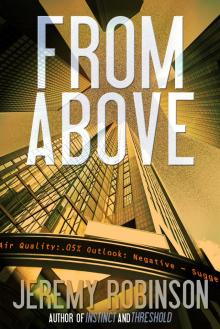 From Above - A Novella
From Above - A Novella Flux
Flux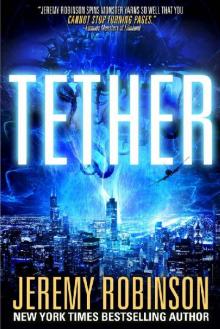 Tether
Tether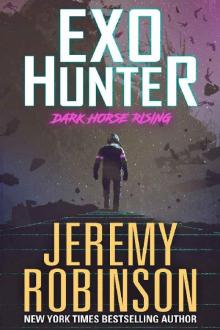 Exo-Hunter
Exo-Hunter Pulse
Pulse Cannibal
Cannibal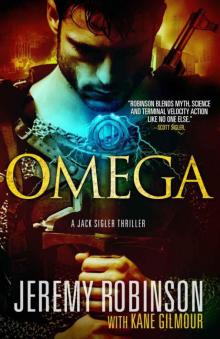 Omega: A Jack Sigler Thriller cta-5
Omega: A Jack Sigler Thriller cta-5 Flood Rising (A Jenna Flood Thriller)
Flood Rising (A Jenna Flood Thriller)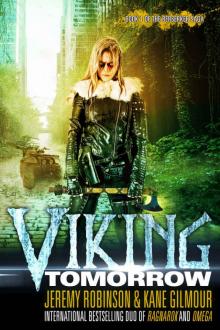 Viking Tomorrow
Viking Tomorrow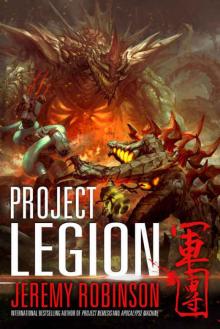 Project Legion (Nemesis Saga Book 5)
Project Legion (Nemesis Saga Book 5) BENEATH - A Novel
BENEATH - A Novel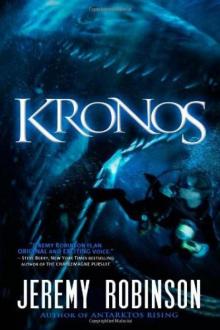 Kronos
Kronos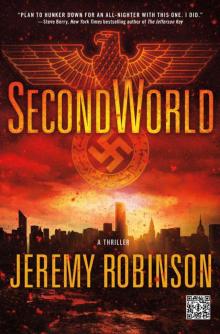 SecondWorld
SecondWorld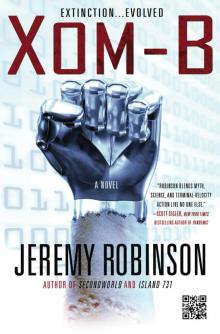 XOM-B
XOM-B Forbidden Island
Forbidden Island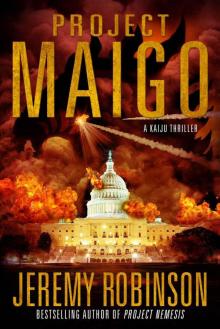 Project Maigo
Project Maigo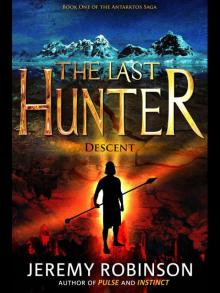 The Last Hunter - Descent (Book 1 of the Antarktos Saga)
The Last Hunter - Descent (Book 1 of the Antarktos Saga)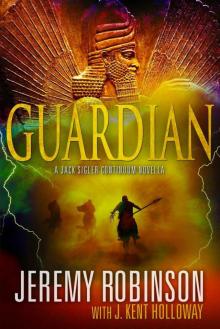 Jack Sigler Continuum 1: Guardian
Jack Sigler Continuum 1: Guardian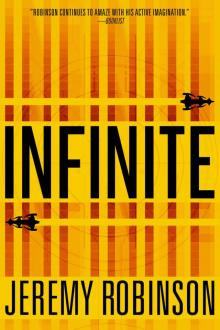 Infinite
Infinite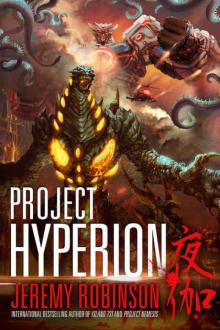 Project Hyperion
Project Hyperion The Distance
The Distance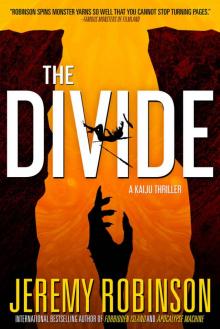 The Divide
The Divide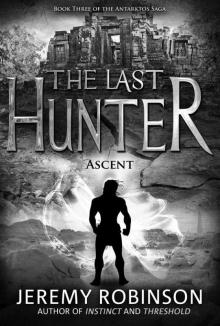 The Last Hunter - Ascent (Book 3 of the Antarktos Saga)
The Last Hunter - Ascent (Book 3 of the Antarktos Saga)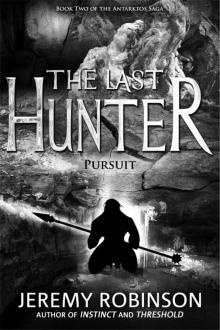 The Last Hunter - Pursuit (Book 2 of the Antarktos Saga)
The Last Hunter - Pursuit (Book 2 of the Antarktos Saga) Raising the Past
Raising the Past The Others
The Others The Last Hunter - Collected Edition
The Last Hunter - Collected Edition Threshold
Threshold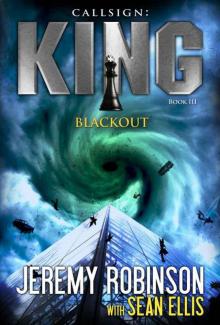 Blackout ck-3
Blackout ck-3 Antarktos Rising
Antarktos Rising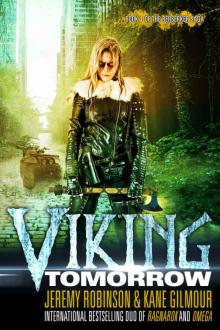 Viking Tomorrow (The Berserker Saga Book 1)
Viking Tomorrow (The Berserker Saga Book 1) The Didymus Contingency
The Didymus Contingency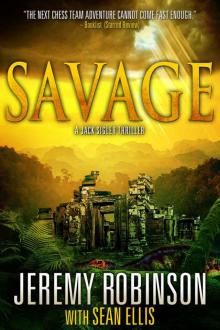 Savage (Jack Sigler / Chess Team)
Savage (Jack Sigler / Chess Team)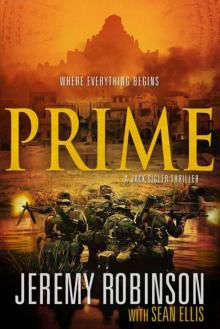 Prime
Prime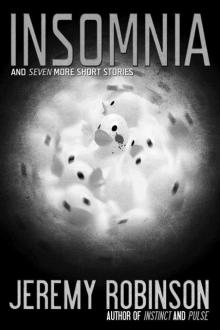 Insomnia and Seven More Short Stories
Insomnia and Seven More Short Stories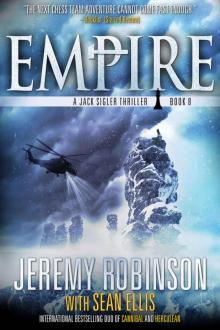 Empire (A Jack Sigler Thriller Book 8)
Empire (A Jack Sigler Thriller Book 8)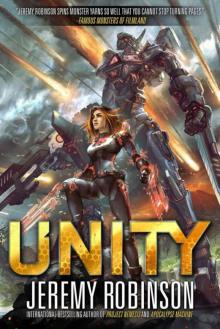 Unity
Unity Instinct
Instinct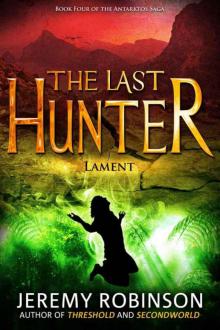 The Last Hunter - Lament (Book 4 of the Antarktos Saga)
The Last Hunter - Lament (Book 4 of the Antarktos Saga)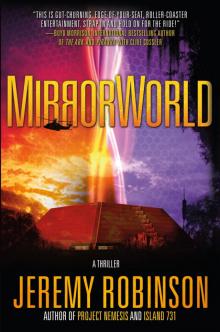 MirrorWorld
MirrorWorld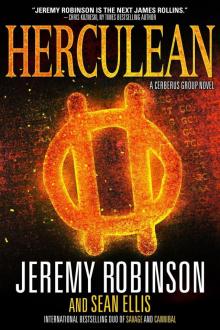 Herculean (Cerberus Group Book 1)
Herculean (Cerberus Group Book 1) Island 731
Island 731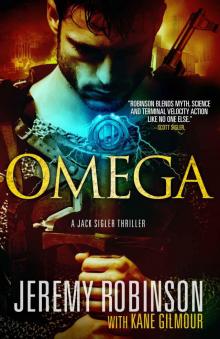 Omega: A Jack Sigler Thriller
Omega: A Jack Sigler Thriller Patriot (A Jack Sigler Continuum Novella)
Patriot (A Jack Sigler Continuum Novella) 5 Onslaught
5 Onslaught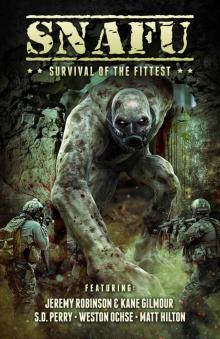 SNAFU: Survival of the Fittest
SNAFU: Survival of the Fittest Helios (Cerberus Group Book 2)
Helios (Cerberus Group Book 2)